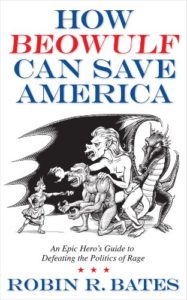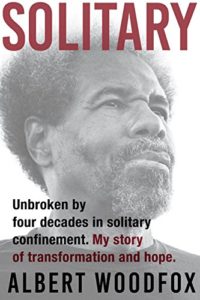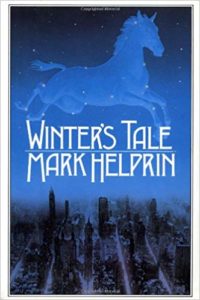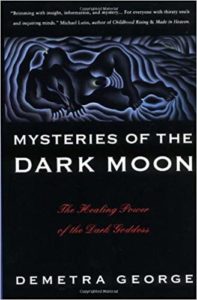Reading in Dark Times

Dark Moon
It can be difficult for me to remain cheery in the midst of world events. It’s hard to remember that all things are born, live and die into transformation, only to repeat the cycle over and over again. This is true, I believe of all sentient things, as well as eras, cultures, nations, planets…
The moon begins as a sliver of hope, grows to glorious fullness, fades away, leaves us in the dark for a time as she transitions, and then is born again. So do all things. These days, I anxiously await the return of the light, while at the same time I try to remain constant in my wonder and gratitude for this indescribably beautiful world.
Living in this time of transformation, in the dark time before the light returns, as return it will, means I have to pay special attention to my mental, emotional and spiritual health. Otherwise, like our coastlines, I’ll soon be drowning.
I had to get of social media (again) for a while since I found it overwhelmingly depressing. If I saw one more story about someone being unspeakable cruel to an animal or how the last of this or that species is snuffed out as we careen toward ecological destruction or how someone else has suffered injustice on a life-ending scale… well, you get the idea.
So what’s a writer/reader to do?
Books. Start there as always.
I have a friend I’ve never met in person, but with whom I feel a real bond. His name is  Robin Bates. He is an academic and lifelong devotee to literature. He has written a terrific book called How Beowulf Can Save America and writes a great blog called Better Living Through Beowulf. On the blog, he examines current events and draws our attention back to great works of literature for perspective. I’m an avid fan, and I think you might like it as well. I urge you to visit it, leave a comment, and tell ‘im I sent you!
Robin Bates. He is an academic and lifelong devotee to literature. He has written a terrific book called How Beowulf Can Save America and writes a great blog called Better Living Through Beowulf. On the blog, he examines current events and draws our attention back to great works of literature for perspective. I’m an avid fan, and I think you might like it as well. I urge you to visit it, leave a comment, and tell ‘im I sent you!
 Also, today I was reading the New York Times and found a great review of a new book by Albert Woodfox (with Leslie George) called SOLITARY:Unbroken by Four Decades in Solitary Confinement. My story of transformation and hope.
Also, today I was reading the New York Times and found a great review of a new book by Albert Woodfox (with Leslie George) called SOLITARY:Unbroken by Four Decades in Solitary Confinement. My story of transformation and hope.
Transformation? Hope? Heck. Take my money!
There are certain books that have become touchstones  for me over the years. C.S. Lewis’s The Narnian Suite is certainly one of them. In fact, I often say I learned most of my theology (at least the useful, practical bits, from the last book in that series, The Last Battle.) So much here is about perception and intention. Although the imagery is (at times ponderously) Christian, it transcends any religion, I feel. One of those, “don’t judge, just experience” moments.
for me over the years. C.S. Lewis’s The Narnian Suite is certainly one of them. In fact, I often say I learned most of my theology (at least the useful, practical bits, from the last book in that series, The Last Battle.) So much here is about perception and intention. Although the imagery is (at times ponderously) Christian, it transcends any religion, I feel. One of those, “don’t judge, just experience” moments.
 Mark Helprin’s, A Winter’s Tale is still a favorite, for its beautiful language and audacity. It’s part fairy tale and part Dickensian city-fable, and about which Benjamin de Mott said, in his lovely NYTimes review, ”Winter’s Tale” stands forth in its own right as restorer and comforter.” In these difficult times, can we not use some restoration, some comfort?
Mark Helprin’s, A Winter’s Tale is still a favorite, for its beautiful language and audacity. It’s part fairy tale and part Dickensian city-fable, and about which Benjamin de Mott said, in his lovely NYTimes review, ”Winter’s Tale” stands forth in its own right as restorer and comforter.” In these difficult times, can we not use some restoration, some comfort?
(I have always loved fairy-tales and fables, and it’s books like Helprin’s that gave me the confidence to write The Grimoire of Kensington Market.)
Jane Gardam’s brilliant Old Filth invites me into a  relationship with a man whose life, both on the edges of the world stage and in intimate domesticity, and without much fanfare, helps me map the narrative of my own life, and perhaps find meaning in it. Review Paul Gray puts says, “Yet the miracle of “Old Filth” is that its hero eludes sociological or psychological pigeonholing. If he is a characteristic Raj orphan, he is also triumphantly his own man, with a life full of unexpected turns and events of high comedy to offset and compensate for his unpromising beginnings.” The hero is, in the novel, old, close to the end, slightly baffled by his life. Yes, well…
relationship with a man whose life, both on the edges of the world stage and in intimate domesticity, and without much fanfare, helps me map the narrative of my own life, and perhaps find meaning in it. Review Paul Gray puts says, “Yet the miracle of “Old Filth” is that its hero eludes sociological or psychological pigeonholing. If he is a characteristic Raj orphan, he is also triumphantly his own man, with a life full of unexpected turns and events of high comedy to offset and compensate for his unpromising beginnings.” The hero is, in the novel, old, close to the end, slightly baffled by his life. Yes, well…
Or, how can we not find a piece of our souls in James  Baldwin’s If Beale Street Could Talk, which is a tragedy, of course, but one not without hope, because love remains, and cannot be crushed, even in this cruel and unjust world of ours? The film is wonderful, and the book sublime. In fact, it should be required reading for every single person in America. Yup. It should.
Baldwin’s If Beale Street Could Talk, which is a tragedy, of course, but one not without hope, because love remains, and cannot be crushed, even in this cruel and unjust world of ours? The film is wonderful, and the book sublime. In fact, it should be required reading for every single person in America. Yup. It should.
Good lord. I just realized how long this post will be if I don’t stop here… but of course… just one more, please?
Since you insist. Just one more. I’m reading this right now, and it offers some marvelous and magical insight into the idea of cyclical events, both personal and cosmological. It’s Demetra George’s fascinating book, Mysteries of the Dark Moon: the healing power of the dark Goddess. For anyone interested in knowing more about how the imbalance between male and female energies, between the Old Triple Goddess and the far newer male God of ‘modern’ times is at the root cause of many of our present troubles, I highly recommend it.
and it offers some marvelous and magical insight into the idea of cyclical events, both personal and cosmological. It’s Demetra George’s fascinating book, Mysteries of the Dark Moon: the healing power of the dark Goddess. For anyone interested in knowing more about how the imbalance between male and female energies, between the Old Triple Goddess and the far newer male God of ‘modern’ times is at the root cause of many of our present troubles, I highly recommend it.
As Demetra George tells us, there is much to be learned, and much healing to be done in the dark period. Imagery has changed over the past few thousand years so that darkness is seen as frightening and evil (see James Baldwin’s work, above!) and brightness and reassuring and good. It wasn’t always this way. It doesn’t need to be now.
Perhaps this is the time to plant the seeds of those things we wish to see growing in our world.
What are you reading in hard times? I’d love to know.
I’m not surprised by the overlap in our taste/interests but I am thrilled to see you’re reading Demetra George’s book, which I have had on my shelf for simply ages (but never have read straight though – now I shall begin in earnest). And A Winter’s Tale is so beautiful. As if I didn’t already want to visit NYC for a hundred reasons (Baldwin among them). Jane Gardam is another of my MustReadEverything authors. Her short stories are lovely too. (I’ve only read the first of this trilogy, but i’m not in a rush – I like knowing there is more of her to come.) A Long Way from Verona is a real favourite among her novels. Robin Bates’ articles are certainly thought-provoking: no wonder you enjoy/appreciate his work so much. Have you read Laura Miller’s book about rereading Narnia as an adult? Lots of good bookish bits in there too.
Keep on keeping on and reading on: books are life-preservers!
I haven’t read Laura Miller’s book, but I’ve heard of it — first step to making it’s way to the to-read pile!
And you’re right, of course, books are life-preservers!